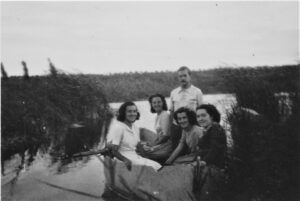In her first letter, my mother addresses him formally, as Vosté. He is, after all, her violin teacher from Barcelona. He has invited her and her family to a concert of violin and piano sonatas performed by himself and his sister. It will take place in a town twelve miles from my mother’s village, Ivars, where she is spending the summer.
Alas, she writes, she probably won’t be able to attend the concert. Her mother has informed her that, since the roads are in a terrible state and there isn’t a single car to be had in the village (this is 1941, two years after the end of the civil war that left Spain in ruins), the trip by horse-drawn buggy would take four hours each way, clearly too much for both the horse and the guests.
“But listen, Senyor Benejam,” she goes on—and it’s to that “but listen” that I probably owe my existence—“would you and your sister like to come to Ivars?” Getting there won’t be a problem, she assures him, and she explains how they can simply catch the train after the concert, and get off at the station near Ivars, which is only four miles away and thus entirely doable for the family horse, who will come to pick them up.
True, she admits, there isn’t a lot of entertainment in the village. But there are fruit orchards, and a beautiful lake. And, she continues with a touch of irony, “in the farm we have pigeons, chickens, turkeys, ducks—and a radio and a piano as well.” Then she delivers the coup de grâce: “We could have a Mass said at the shrine of Our Lady of the Orchards, and maybe you would play something beautiful for Our Lady…”
How could he resist? Not only does she manage, under a devotional guise, to praise his playing, but she intuits how to brandish before his urban eyes the rustic pleasures of the place. My mother, a farm girl bursting with life force and dreams of an artsy, sophisticated life in the big city, couldn’t have written a more enticing letter if Casanova himself had whispered it into her ear.
My father’s visit to Ivars, that Catalan Arcadia, marked the beginning of an idyll that grew to mythical dimensions in the eyes of the entire family and lasted until his death. Recorded in hundreds of letters and notes from him to her and her to him, and shrouded in misty allusions to music, poetry, God, and Nature, my parents’ passion left Tristan and Isolde, Dante and Beatrice, and Dido and Aeneas in the dust. With one crucial difference: whereas all these lovers promptly came to a tragic end, my parents’ flame burned on and on.
I can understand that sublimation may, at the beginning, have played a part in this. My mother was twenty-three when they met, my father twenty-seven. Not only were they both virgins, but, as he informs her proudly (“not everybody can say this!”), she was the first woman he had ever kissed. But there were more kisses after the first one, followed by marriage, parenthood, and daily life with its drudgery and money worries, yet the passionate letters continued. The last one in my possession dates from over a decade after their marriage.
My fingers tremble a bit as I unfold the yellowing, crumbling sheets. I struggle to decipher the words—my father’s faded calligraphy remains exquisite even when he’s writing on the back of a business card, whereas my mother’s degenerates to a scrawl when in the grip of passion. It seems extraordinary for a couple not only to harbor such intense mutual adoration (“You were born of an angel’s smile…” “Our home will be a temple to Love and Beauty…”), but to express it over and over, for years on end.
And I—“the daughter of our immense and unique love,” as my father refers to me in the letters—am left feeling both blessed and a little wistful, the all too human spectator of their celestial waltz.
You can see the lake, with the Pyrenees in the background, here.
And here they are during that fateful visit: my father and mother at the back, my father’s sister in the white dress, and my mother’s sisters:



3 Responses
For faded texts, scan with a color scanner, and then enhance the contrast. Amazing what a machine can see when we can’t.
Our original marriage certificate was almost illegible until I did this; then, no problem.
How sweet of your parents – today’s kids have only silly texts on the phones.
I sometimes wonder how many of those feelings they would have felt if they hadn’t been obliged to put them on paper.
I love this.